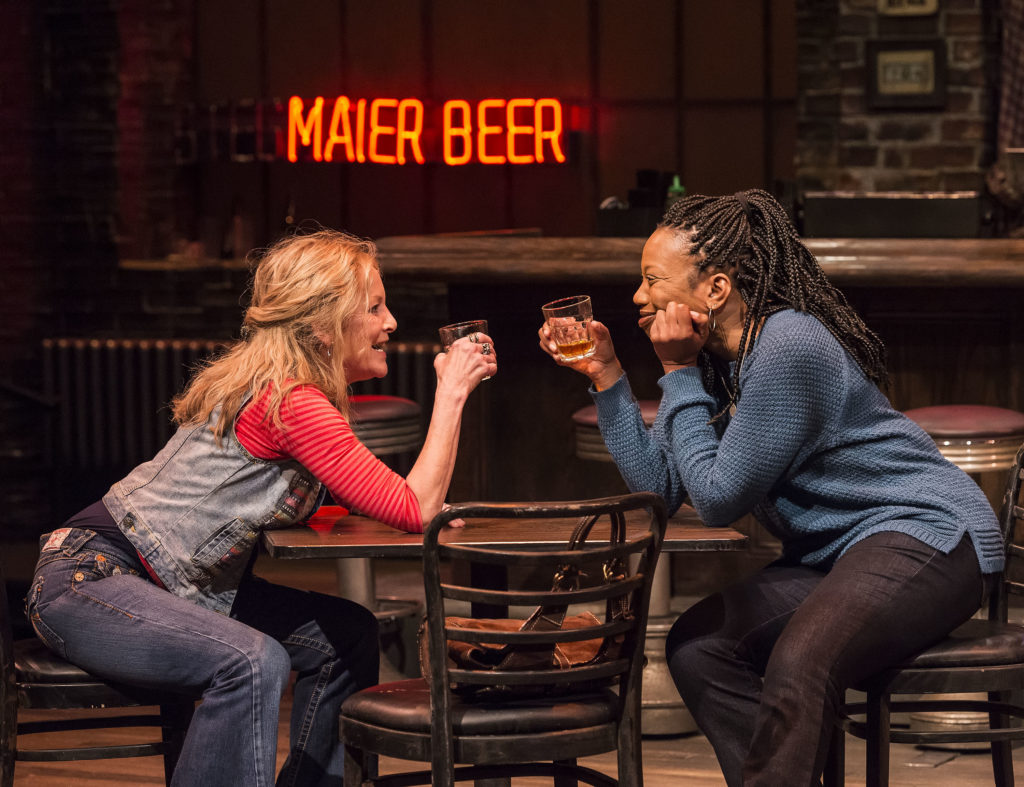Culture & Media
Stage Review: Workers Drown in Blood, Sweat and Beers
Sweat ‘s unflinching mission is to lay out the slow strangulation of the American Dream.

Most of the action in Lynn Nottage’s 2015 social drama takes place in a Reading, Pennsylvania bar that serves as the home away from home for local factory hands. Sweat opens, portentously enough, during the 2008 financial meltdown — Wall Street’s equivalent of the hollowing out of blue collar jobs that occurred eight years earlier, thanks to NAFTA and its progeny. Red and yellow stock market quotations scroll across the bar’s industrial-gothic walls as news of the crisis ricochets around the Mark Taper Forum. (Projections by Yee Eun Nam; scenic design by Christopher Barreca; sound by Paul James Prendergast.)
Two young men, Jason and Chris (Will Hochman and Grantham Coleman, respectively) meet with a parole officer (Kevin T. Carroll) after their release from prison. The revenants are little more than shadows from a more prosperous past that holds the secret to the crime that sent them behind bars. And yet our interest really doesn’t rest with their felony, which we’re only reminded of whenever designer Anne Militello’s lights go down cold and low, and other characters begin frowning at the two. The play’s true dynamic is the fraying, metaphoric friendship between mill workers Tracey (Mary Mara) and Cynthia (Portia). The middle-age women, mothers to Jason and Chris, and die-hard union members, have both applied for a single management position in their factory. When Portia, who is black, receives the promotion, white Tracey and others in the bar turn against her.
Toggling between boozy 2000 and penitent 2008, the story’s issues play out like a series of grievances: The betrayal that African-American characters feel toward both the company and a union that has kept them at arm’s length; the hurt that the dope-addled Brucie (John Earl Jelks) has inflicted on his wife, Cynthia; the resentment that bartender Stan (Michael O’Keefe) harbors against a company that threw him out after nearly 30 years because of a shop-floor accident. These wounds all become exacerbated — and the bar, a toxic debate forum — when the company radically downsizes and makes crippling demands of the union.
Sweat‘s strength lies in its unflinching mission to lay out the slow strangulation of the American Dream, as that dream was imagined by different parts of the country’s post-war working class — from self-entitled whites to stifled minorities to aspiring Latino immigrants. Under Lisa Peterson’s broad direction at the Taper, the play’s latent weaknesses become vividly apparent — the reduction of the ensemble’s personalities to colorful “types,” the lack of onstage villains and the fact that the pivotal Cynthia never seems in any kind of emotional conflict with her erstwhile factory buddies. (They’re pissed off at her, but she never really bites back at them, despite her announced desire to better herself.) The actors get loud enough but, with the exception of Portia, lack ensemble chemistry; a few actors even seemed to have difficulty pronouncing the word “ain’t.”
Mark Taper Forum, 135 N. Grand Ave., Los Angeles. Wed.-Fri., 8 p.m.; Sat., 2:30 & 8 p.m.; Sun., 1 & 6:30 p.m.; thru Oct. 7. (213) 628-2772.
Copyright Capital & Main

-

 Latest NewsFebruary 3, 2026
Latest NewsFebruary 3, 2026Amid the Violent Minnesota Raids, ICE Arrests Over 100 Refugees, Ships Many to Texas
-

 Featured VideoFebruary 4, 2026
Featured VideoFebruary 4, 2026Protesters Turn to Economic Disruption to Fight ICE
-

 The SlickFebruary 2, 2026
The SlickFebruary 2, 2026Colorado May Ask Big Oil to Leave Millions of Dollars in the Ground
-

 Column - State of InequalityFebruary 5, 2026
Column - State of InequalityFebruary 5, 2026Lawsuits Push Back on Trump’s Attack on Child Care
-

 Column - California UncoveredFebruary 6, 2026
Column - California UncoveredFebruary 6, 2026What It’s Like On the Front Line as Health Care Cuts Start to Hit
-

 The SlickFebruary 10, 2026
The SlickFebruary 10, 2026New Mexico Again Debates Greenhouse Gas Reductions as Snow Melts
-

 Latest NewsFebruary 12, 2026
Latest NewsFebruary 12, 2026Trump Administration ‘Wanted to Use Us as a Trophy,’ Says School Board Member Arrested Over Church Protest
-

 Latest NewsFebruary 10, 2026
Latest NewsFebruary 10, 2026Louisiana Bets Big on ‘Blue Ammonia.’ Communities Along Cancer Alley Brace for the Cost.

